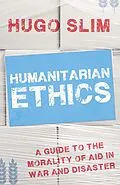Humanitarians are required to be impartial, independent, professionally competent and focused only on preventing and alleviating human suffering. It can be hard living up to these principles when others do not share them, while persuading political and military authorities and non-state actors to let an agency assist on the ground requires savvy ethical skills. Getting first to a conflict or natural catastrophe is only the beginning, as aid workers are usually and immediately presented with practical and moral questions about what to do next. For example, when does working closely with a warring party or an immoral regime move from practical cooperation to complicity in human rights violations? Should one operate in camps for displaced people and refugees if they are effectively places of internment? Do humanitarian agencies inadvertently encourage ethnic cleansing by always being ready to 'mop-up' the consequences of scorched earth warfare? This book has been written to help humanitarians assess and respond to these and other ethical dilemmas.
Autorentext
Hugo Slim (PhD) is a leading scholar of Humanitarian Studies with particular expertise in humanitarian ethics, the protection of civilians, conflict resolution, and international business ethics. He is Senior Research Fellow at the University of Oxford Institute for Ethics, Law and Armed Conflict and author of Killing Civilians: Method, Madness and Morality in War.
Inhalt
Introduction PART ONE ETHICAL FOUNDATIONS 1. The Ethical Origins of Humanitarian Action PART TWO THE MODERN ELABORATION OF HUMANITARIAN PRINCIPLES 2. The Humanitarian GoalHumanity and Impartiality 3. Political PrinciplesNeutrality and Independence 4. Dignity PrinciplesParticipation, Empowerment and Respect 5. Stewardship PrinciplesSustainability and Accountability 6. What Kind of Ethics is Humanitarian Ethics? PART THREE ETHICAL PRACTICE IN HUMANITARIAN ACTION 7. Reason and Emotion 8. Humanitarian Deliberation 9. The Structure of Moral Choices 10. Moral Responsibility in Humanitarian Ethics 11. Persistent Ethical Problems in Humanitarian Action 12. The Ethical Humanitarian Worker Annex 1 The Principles of the Red Cross and Red Crescent Movement Annex 2 The Code of Conduct for NGOs in Disaster Relief Annex 3 The Humanitarian Charter Annex 4 Principles of Good Humanitarian Donorship
